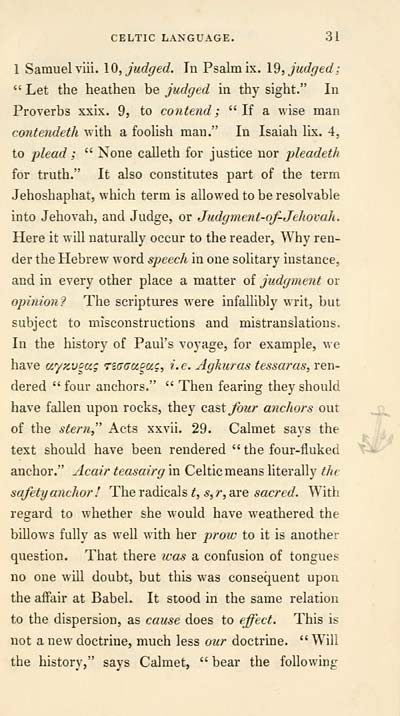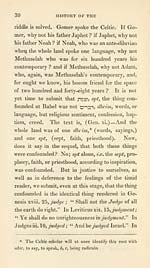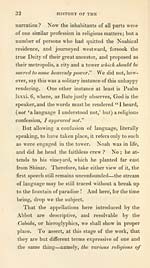Download files
Complete book:
Individual page:
Thumbnail gallery: Grid view | List view

CELTIC LANGUAGE. 31
1 Samuel viii. 10, judged. In Psalm ix. 19, judged:
" Let the heathen be judged in thy sight." In
Proverbs xxix. 9, to contend; "If a wise man
contendeth with a foolish man." In Isaiah lix. 4,
to jilead : " None calleth for justice nor pleadeth
for truth." It also constitutes part of the term
Jehoshaphat, which term is allowed to be resolvable
into Jehovah, and Judge, or Judgment-of- Jehovah.
Here it will naturally occur to the reader, Why ren-
der the Hebrew word speech in one solitary instance,
and in every other place a matter of judgment or
opinion? The scriptures were infallibly writ, but
subject to misconstructions and mistranslations.
In the history of Paul's voyage, for example, we
have uyKVoag rzaaa^uc, i.e. Agkuras tessaras, ren-
dered " four anchors." " Then fearing they should
have fallen upon rocks, they cast Jour anchors our
of the stern," Acts xxvii. 29. Calmet says the
text should have been rendered " the four-fluked
anchor." Acair teasairg in Celtic means literally the
safety anchor ! The radicals t, s,r, are sacred. With
regard to whether she w ould have weathered the
billows fully as well with her prow to it is another
question. That there icas a confusion of tongues
no one will doubt, but this was consequent upon
the aflair at Babel. It stood in the same relation
to the dispersion, as cause does to effect. This is
not a new doctrine, much less our doctrine. " Will
the history," says Calmet, " bear the following
1 Samuel viii. 10, judged. In Psalm ix. 19, judged:
" Let the heathen be judged in thy sight." In
Proverbs xxix. 9, to contend; "If a wise man
contendeth with a foolish man." In Isaiah lix. 4,
to jilead : " None calleth for justice nor pleadeth
for truth." It also constitutes part of the term
Jehoshaphat, which term is allowed to be resolvable
into Jehovah, and Judge, or Judgment-of- Jehovah.
Here it will naturally occur to the reader, Why ren-
der the Hebrew word speech in one solitary instance,
and in every other place a matter of judgment or
opinion? The scriptures were infallibly writ, but
subject to misconstructions and mistranslations.
In the history of Paul's voyage, for example, we
have uyKVoag rzaaa^uc, i.e. Agkuras tessaras, ren-
dered " four anchors." " Then fearing they should
have fallen upon rocks, they cast Jour anchors our
of the stern," Acts xxvii. 29. Calmet says the
text should have been rendered " the four-fluked
anchor." Acair teasairg in Celtic means literally the
safety anchor ! The radicals t, s,r, are sacred. With
regard to whether she w ould have weathered the
billows fully as well with her prow to it is another
question. That there icas a confusion of tongues
no one will doubt, but this was consequent upon
the aflair at Babel. It stood in the same relation
to the dispersion, as cause does to effect. This is
not a new doctrine, much less our doctrine. " Will
the history," says Calmet, " bear the following
Set display mode to: Large image | Transcription
Images and transcriptions on this page, including medium image downloads, may be used under the Creative Commons Attribution 4.0 International Licence unless otherwise stated. ![]()
| Early Gaelic Book Collections > Blair Collection > History of the Celtic language > (37) |
|---|
| Permanent URL | https://digital.nls.uk/76179016 |
|---|
| Description | A selection of books from a collection of more than 500 titles, mostly on religious and literary topics. Also includes some material dealing with other Celtic languages and societies. Collection created towards the end of the 19th century by Lady Evelyn Stewart Murray. |
|---|
| Description | Selected items from five 'Special and Named Printed Collections'. Includes books in Gaelic and other Celtic languages, works about the Gaels, their languages, literature, culture and history. |
|---|

